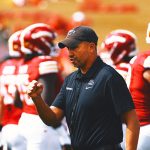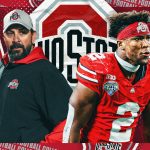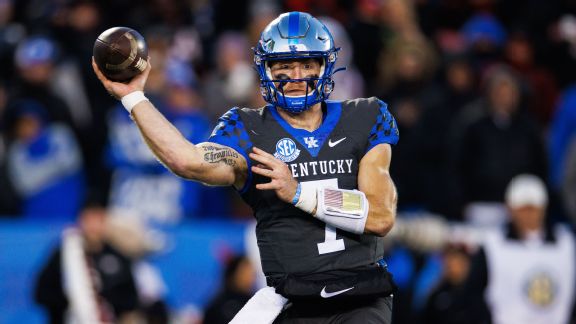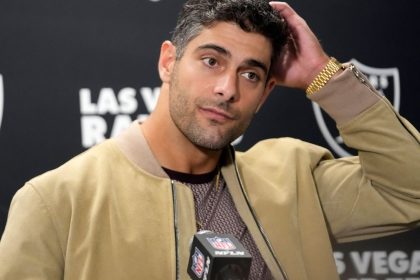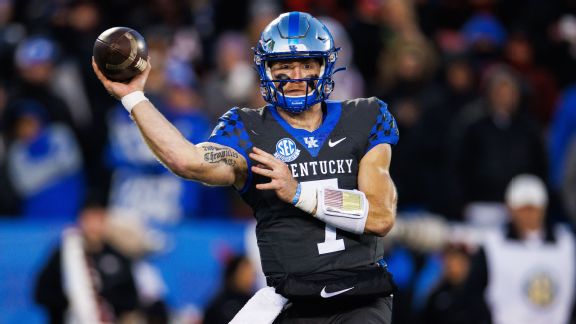
INDIANAPOLIS – The Indianapolis Colts’ intention to select a quarterback in Thursday’s first round of the NFL draft (8 p.m. ET on ESPN, ABC and ESPN App) is considered among the worst-kept secrets in the league.
Both privately and publicly, it’s been the primary topic of discussion for months, from owner Jim Irsay on down. Meanwhile, the team’s fans continue to obsess over Indy’s upcoming fourth overall pick, eagerly awaiting a potential solution to the lingering quarterback problem.
Much less clear, however, is which quarterback the Colts see as the best fit. At some point in recent months, reports have linked Indianapolis to each of the presumptive top four quarterbacks in this draft: Alabama’s Bryce Young, Ohio State’s C.J. Stroud, Florida’s Anthony Richardson and Kentucky’s Will Levis.
Good luck pinning them down, because it appears they’re still working through the decision.
“People think … the decision’s made, or decision makers aren’t telling anyone,” Irsay told ESPN Monday. “That’s not true a lot of times. Honestly, this is as much intrigue and as much debate [as I’ve seen]. You have four guys and they’re all worthy of being the No. 1 pick in the draft. Any of the four you take at [No.] 1, people can’t slam anyone for it.
“I’m not being evasive. I’m being honest. Really, we are still debating what our options are.”
Said general manager Chris Ballard: “I just always love to read the reports that the Colts love this guy, and they love this guy and they’re dialed in on this guy. Like, who’d that come from? It didn’t come from me.”
Here is, perhaps, the biggest reason it’s been so difficult to handicap the Colts’ preferred style of quarterback: Because there isn’t one.
The Colts, under first-year coach Shane Steichen, have taken a particularly open-minded approach to scouting this year’s quarterback class. The reason? Because Steichen’s offensive adaptability allows them to do so.
“I think you fit the system around the guy that’s playing,” Steichen said.
That’s been something of a game-changer for the organization as it sets out to make one of its biggest selections in years. The Colts feel they are not beholden to a certain profile in the quarterback they are seeking because their offensive philosophy is flexible.
“That broadens the field for you,” Ballard said. “That’s a good thing. And I think as we’ve gone through the process of all the evaluations, and coming down to what we think will be best for the Indianapolis Colts, whoever we end up taking is going to be that guy and [Steichen] will make it work.”
The Colts aren’t talking about making slight adjustments based on the quarterback. Instead, they seem to be suggesting the specific quarterback will largely dictate their style of offense.
“It doesn’t matter who the quarterback is,” Ballard said. “You’re going to build an offense different for Peyton Manning [than] you’re going to build for Michael Vick. It’s just going to be different. I think it comes down to who you believe you can build the offense around the best and win games with.”
Steichen has been light on specifics when asked details of the offensive scheme he is installing. But what’s clear is the Colts are putting a great deal of faith in his ability to help the eventual rookie quarterback succeed.
“His scheme will allow us to pick a quarterback with some flaws because he will build the offense around their strengths and deal with the flaws,” one team source said.
That is a departure from the past. Though former coach Frank Reich was seen as an elite quarterback tutor, he had a more specific profile for his ideal quarterback that did place some limits on the personnel staff. One example: Because Reich’s system involved a high level of complexity, the processing ability of his quarterbacks was critical. That could be part of what makes Young appealing to Reich’s new team, the Carolina Panthers. Carolina is widely expected to use the first overall pick to select Young, who is seen as an elite processor.
Because Steichen is so central to all of this, he will heavily influence which quarterback the Colts select.
“Obviously, Shane has to say, ‘OK,’” Irsay said. “Chris and I both respect that, and Shane’s going to have a big say.”
Steichen is most closely associated with Philadelphia Eagles quarterback Jalen Hurts, serving as the team’s offensive coordinator the past two seasons. Granted, the coach and quarterback enjoyed great success together, with Hurts having a brilliant 2022 season and the Eagles advancing to the Super Bowl.
Hurts being a dual-threat quarterback who rushed for a combined 1,544 yards in the past two seasons under Steichen, an assumption is often made that Steichen would rather target a quarterback with a similar skill set. Think more Richardson than Stroud.
But that version is only part of Steichen’s story. It omits his two seasons as the Los Angeles Chargers’ offensive coordinator, during which his quarterbacks were Philip Rivers and Justin Herbert. Both Rivers and Herbert are more classic drop-back quarterbacks, meaning Steichen had to use a different approach with them under center compared with Hurts.
To that end, Steichen was asked recently if he preferred a quarterback with mobility. He quickly downplayed the importance.
“Not necessarily,” he said. “Quarterbacks come in all shapes and sizes and have different athletic abilities, whether it’s running or throwing. Does [mobility] add to it? Yes … But there’s also guys that are pure drop-back, pocket passers that are some of the best to ever do it, [like] Peyton and Tom Brady. Is it an added bonus when they can run? Yeah. But it’s not the end all, be all.”
It was a perfectly vague answer, like most of what we’ve heard about the Colts’ quarterback preferences this spring.
The bottom line: The Colts are looking for the best quarterback — not the best quarterback for their particular offense.
“You’ve got to do a great job of putting these guys in position to maximize their potential so they can shine on Sunday,” Steichen said. “That’s our job as coaches, to figure that out … and put them in position to make plays.”

